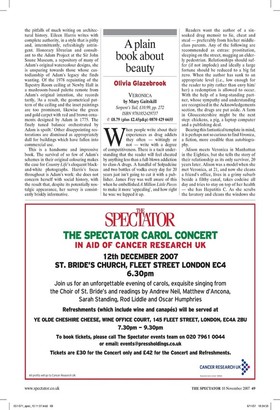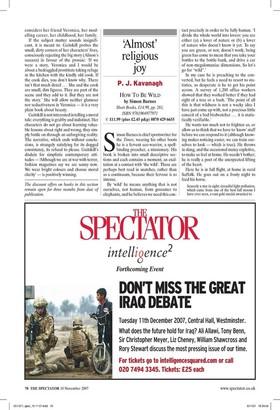A plain book about beauty
Olivia Glazebrook VERONICA by Mary Gaitskill Sopent's Tail, £10.99, pp. 272 ISBN 9781852429737 © £8.79 (plus £2.45p&p) 0870 429 6655 When people write about their experiences as drug addicts they often — wittingly or not — write with a degree of competitiveness. There is a tacit understanding that the reader will feel cheated by anything less than a full-blown addiction to class-A drugs. A handful of Solpadeine and two bottles of vodka every day for 20 years just isn't going to cut it with a publisher. James Frey was well aware of this when he embellishedA Million Little Pieces to make it more 'appealing', and how right he was: we lapped it up.
Readers want the author of a sinsoaked drug memoir to lie, cheat and steal — preferably from his/her middleclass parents. Any of the following are recommended as extras: prostitution, sleeping on the street, mugging an elderly pedestrian. Relationships should suffer (if not implode) and ideally a large fortune should be reduced to a big fat zero. When the author has sunk to an appropriate level (i.e., low enough for the reader to pity rather than envy him/ her) a redemption is allowed to occur. With the help of a long-standing partner, whose sympathy and understanding are recognised in the Acknowledgements section, the drugs are put aside. A farm in Gloucestershire might be the next step: chickens, a pig, a laptop computer and a publishing deal.
Bearing this fantastical template in mind, it is perhaps not so curious to find Veronica, a fiction, more credible than autobiography.
Alison meets Veronica in Manhattan in the Eighties, but she tells the story of their relationship as its only survivor, 20 years later. Alison was a model when she met Veronica, at 21, and now she cleans a friend's office, lives in a grimy suburb beside a filthy canal, takes codeine all day and tries to stay on top of her health — she has Hepatitis C. As she scrubs the lavatory and cleans the windows she considers her friend Veronica, her modelling career, her childhood, her family.
If the subject matter sounds insignificant, it is meant to. Gaitskill probes the small, dirty corners of her characters' lives, consciously rejecting the big story (Alison's success) in favour of the prosaic: 'If we were a story, Veronica and I would be about a bedraggled prostitute taking refuge in the kitchen with the kindly old cook. If the cook dies, you don't know why. There isn't that much detail ... She and the cook are small, dim figures. They are part of the scene and they add to it. But they are not the story.' She will allow neither glamour nor seductiveness in Veronica — it is a very plain book about beauty.
Gaitskill is not interested in telling a moral tale: everything is grubby and indistinct. Her characters do not go about learning valuable lessons about right and wrong, they simply battle on through an unforgiving reality. The narrative, which ends without conclusions, is strangely satisfying for its dogged consistency, its refusal to please. Gaitskill's disdain for simplistic contemporary attitudes — 'Although we are at war with terror, fashion magazines say we are sunny now. We wear bright colours and choose moral clarity' — is positively winning.
The discount offers on books in this section remain open for three months from date of publication.






































































 Previous page
Previous page